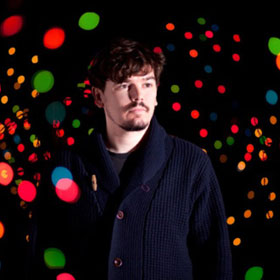'Silver Wilkinson' Music Review: Bibio Creates An Entire Album Worth Listening To

4/5
Stephen Wilkinson, known musically as Bibio, released his seventh album, Silver Wilkinson, on Warp Records. The English music producer from Wolverhampton’s new album can be labeled within the electric genre with hints of indie and folksy-acoustic influence, and Silver Wilkinson has an organic feel that somehow also makes you feel as though you are out-of-this-world.
Many of the songs flow into one another, making it clear that this soothing album is meant to be listened to all together rather than in pieces. It is easy to often miss the breaks between songs and instead hear a singular and varying flow of mood and melody (“Look at Orion!,” for example, has many different sounds rolled into one song, so it seems plausible that the rest of the songs belong together as well).
Silver Wilkinson is a music-centric album rather than lyric-centric, with many songs lacking any lyrics at all. However, the tonality of each song creates a particular mood, from the mid-album “À tout à l'heure,” which has an upbeat melody, to “Wulf,” which is far more melancholy.
This album has a general tone that is similar to most of Bibio’s previous six EPs, with the main exception being “Mind Bokeh,” which could, by many standards, be defined as alternative/pop-rock. With Silver Wilkinson, the lyrics are relatively more sparse and the songs fit more into the indie genre. This absence allows you to create your own story within much of the music; an easy task given the melodic and eclectic songs.
“The First Daffodils” is a weary-sounding open to the album. Slightly off-key tones and a slow flow make it almost hard to listen to. The sounds of rain faded into the background give it an earthy feel and bring the song back from complete lethargy.
“Dye The Water Green” has flute sounds and guitar strums that make the start of it almost like a fairytail-lie. The singing is echoed and ethereal. It has the first truly earthy and organic strain on the album. Though some might find the somewhat difficult-to-decipher lyrics frustrating, it rather adds to the ethereal feeling. However, the harsher guitar and more electric tones toward the end of the song take away from its initial feel.
“Wulf,” like “The First Daffodils,” has a slightly off-key melody, but in this short song the hollow electric sounds mix with recordings of water flowing and small waves crashing. The combination immerses you deeper in the organic feeling of the album.
This flows smoothly into “Mirroring All,” which has constant sounds of wind and higher-pitched singing and guitar. If you were not looking at the playlist, you might even think that these two songs were one long song. “Mirroring All” is the first song with power behind it. Whereas the other songs were purely smooth and odd, this one has stronger beats and lyrics tied in. Though it ends softly, leading to an abrupt song change, it is a truly enjoyable and intriguing song.
“À tout à l'heure” gives the album its first jovial, almost triumphant, note. It is a stark contrast to the previous two songs. It is a clap-and-dance along song. While you could easily be frustrated by the sudden change in tone from “Mirroring All,” the fun nature of the song forces you to forgive it.
“Sycamore Silhouetting” returns the album to a simpler, milder tone. With soft guitar strums and horn-like electronic sounds, you are brought back to a peaceful place. Its softness combined with a quicker pace than the past soothing songs make it a pleasure to listen to.
“You” feels somewhat out of place on the otherwise natural-sounding album. With reverberating beats and lyrics that are mostly broken up and auto-tuned – much like Daft Punk – it has a modern tonality that lacks any hint of the earthy feeling felt in previous songs.
“Raincoat” has guitar sounds that fall like raindrops, making the song’s name appropriate. It returns to the simple and ethereal sounds that “You” lacked and has a delightful sound.
“Look at Orion!” is the longest song on the album, and arguably the most enjoyable. It flips through many different tones and feels like several songs pulled into one, mixing modern electric sounds with otherworldly singing and guitars. It begins with a synthesized guitar sound before moving into vibrating voices and softer beats. It then transitions a bit less than halfway through to a more beat-centric melody, while still maintaining its balance. With only about a minute left, it reverts back to a similar synthesized yet calming tone found in the second section of the song. The variance in tones mirrors the eclectic mix found on this album and makes it truly fun to listen to.
“Business Park,” like “You,” feels more modern and less natural than the other songs on Silver Wilkinson. It combines what sounds like an electric harp with a transition to a guitar-and-drum sound you might find in a pop/rock song. Despite all of these varied sounds, however, it is milder and easier to listen to than “You.”
Finally, “You Won’t Remember…” is the most indie-folksy song on the record. With nothing more than simple guitar melodies and soft, almost whispered lyrics, you are brought to the album’s close gently.
As a whole, Silver Wilkinson is a fun and relaxing listen. While each song individually may not be appealing, they all fit together well as one piece. The ethereal, natural and modern mix of songs invites you to be a part of the songs rather than as listener outside of them.
For more music reviews like this 'Silver Wilkinson' review, check out Uinterview's music review section here.
RELATED ARTICLES
Get the most-revealing celebrity conversations with the uInterview podcast!







Leave a comment